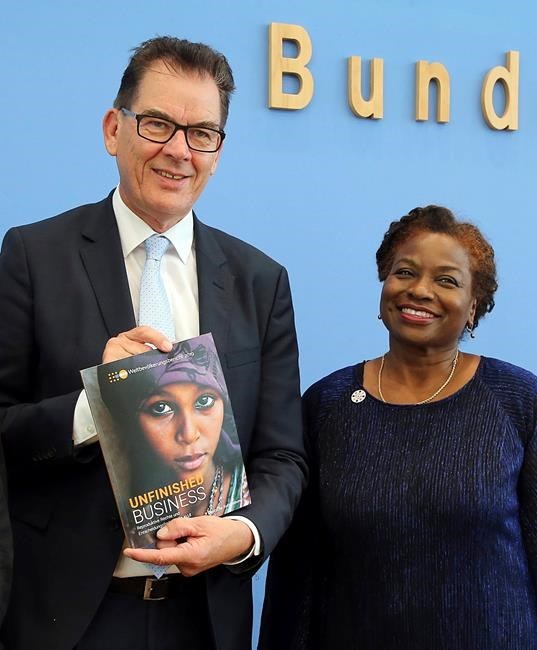
German Economic Cooperation and Development Minister Gerd Mueller, left, and Natalia Kanem, head of the U.N. population agency, present the annual report in Berlin, Germany, Wednesday, April 10, 2019. Kanem said that more than half the $70 million Washington used to give the agency annually was used for life-saving humanitarian programs. (Wolfgang Kumm/dpa via AP)
Republished April 10, 2019 - 7:27 AM
Original Publication Date April 10, 2019 - 3:41 AM
BERLIN - The U.N. population agency chief said Wednesday she regrets the U.S. government's decision to cut funding for programs that help ensure safe pregnancies worldwide.
The United States used to provide about $70 million per year toward UNFPA programs to protect the health and lives of women and girls in developing countries. More than half of those funds were used for "life-saving humanitarian programs," said Dr. Natalia Kanem, the agency's executive director.
The Trump administration announced in 2017 it was cutting all funding to the agency. The move was seen as a gesture to American conservatives and anti-abortion activists, though UNFPA doesn't provide abortions.
"We do regret the decision of the United States to deny funding to UNFPA as we saved so many lives of women and girls together," Kanem told reporters in Berlin at the launch of the agency's annual report .
She cited the agency's work in parts of the world wracked by unrest, where medical care for pregnant women is often not available.
"Even in a place like Venezuela UNFPA is at work every day trying to supply hospitals with desperately needed supplies for safe birth, to train the few doctors that remain on how to deliver babies safely and also to provide contraception to women who do not wish to become pregnant under such circumstances," Kanem said.
UNFPA's report reviews progress made in the half-century since its founding. In 1969, only a quarter of married women worldwide were able to decide whether and when to become pregnant, the agency said. Now, three in five have that choice.
Availability of contraception, improved education and efforts to end child marriage also mean that whereas the average woman had five children throughout her lifetime 50 years ago, now the figure is half that.
Still, populations in poor countries — particularly in Africa — continue to grow at a rapid rate. Kanem said more family planning options could help mothers in places like Niger, where fertility stands at 7.1 children per woman, have smaller families.
Germany's development minister, Gerd Mueller, linked cutting the number of unwanted pregnancies in poor countries to efforts to tackle climate change and hunger.
News from © The Associated Press, 2019